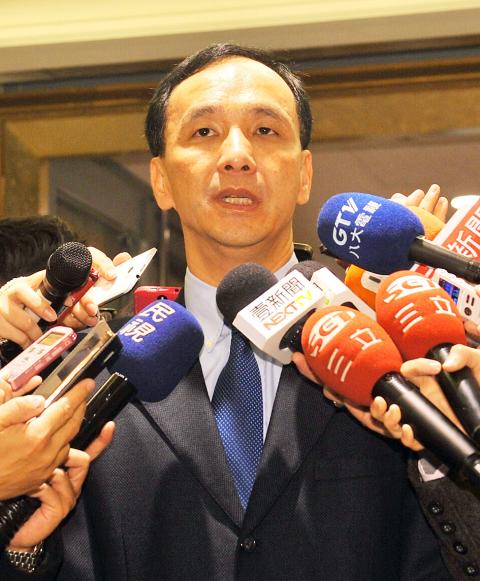Chinese Nationalist Party (KMT) Chairman Eric Chu (朱立倫) yesterday cautioned against holding next year’s presidential and legislative elections on the same day, saying that it would lead to a four-month period between electing a new president and the end of President Ma Ying-jeou’s (馬英九) term on May 20.
The eighth legislature is scheduled to end on Jan. 31 next year, so the election for the ninth legislature has to take place before Jan. 21.
Ma’s term expires on May 20 next year, so the presidential election must be held by April 19.

Photo: Lai Hsiao-tung, Taipei Times
While there are calls to synchronize the two polls, others including former Central Election Commission chairman Huang Shih-cheng (黃石城) have objected to the proposal, saying that the government and the legislature might be forced into a four-month period of inactivity should an opposition candidate win the presidential election in January as he or she would not be able to take office until May.
In response to media queries, Chu yesterday said that there were many viewpoints which had valid aspects, adding that although combining the elections would save money from the public coffers, it also meant that the president-elect would have a four months overlap with the incumbent president.
The issue was extant in the last combined elections in 2012, but worries were greatly mitigated by the fact that Ma was then running for his second term and the probability of a newly elected president having an overlap with the incumbent was split 50-50, Chu said, adding that in next year’s election the problem is bound to occur.
In related news, Democratic Progressive Party (DPP) chairperson Tsai Ing-wen (蔡英文) yesterday said that the issue of the “four-month window” was debated ahead of the 2012 presidential election and that the KMT had then proposed to have the presidential election combined with the legislative election.
The KMT needs to come to a consensus on what its stance is on the issue, and should offer an explanation on why it is reversing its previous support, Tsai said.
The public would believe that political considerations were behind such a reversal of attitudes, Tsai said, adding that the DPP felt that the problem should be based on the stability of the system and resolved via legal regulations.
If such processes are sanctioned by law and become stable long-term systems, political parties could not be accused of seeking to amend processes in their own interests when it suits them, Tsai said.
The DPP has already proposed the draft statute on the handover of the president and the vice president in hope of securing specific regulations and ensuring the stability of the transitioning government, she added.
Asked whether the CEC might rethink its position on the matter after Chu’s comments, Tsai said the commission is a neutral body on electoral matters and should consider which system is best for the nation to guarantee maximum stability.

Taiwanese can file complaints with the Tourism Administration to report travel agencies if their activities caused termination of a person’s citizenship, Mainland Affairs Council Minister Chiu Chui-cheng (邱垂正) said yesterday, after a podcaster highlighted a case in which a person’s citizenship was canceled for receiving a single-use Chinese passport to enter Russia. The council is aware of incidents in which people who signed up through Chinese travel agencies for tours of Russia were told they could obtain Russian visas and fast-track border clearance, Chiu told reporters on the sidelines of an event in Taipei. However, the travel agencies actually applied

Japanese footwear brand Onitsuka Tiger today issued a public apology and said it has suspended an employee amid allegations that the staff member discriminated against a Vietnamese customer at its Taipei 101 store. Posting on the social media platform Threads yesterday, a user said that an employee at the store said that “those shoes are very expensive” when her friend, who is a migrant worker from Vietnam, asked for assistance. The employee then ignored her until she asked again, to which she replied: "We don't have a size 37." The post had amassed nearly 26,000 likes and 916 comments as of this

New measures aimed at making Taiwan more attractive to foreign professionals came into effect this month, the National Development Council said yesterday. Among the changes, international students at Taiwanese universities would be able to work in Taiwan without a work permit in the two years after they graduate, explainer materials provided by the council said. In addition, foreign nationals who graduated from one of the world’s top 200 universities within the past five years can also apply for a two-year open work permit. Previously, those graduates would have needed to apply for a work permit using point-based criteria or have a Taiwanese company

The Shilin District Prosecutors’ Office yesterday indicted two Taiwanese and issued a wanted notice for Pete Liu (劉作虎), founder of Shenzhen-based smartphone manufacturer OnePlus Technology Co (萬普拉斯科技), for allegedly contravening the Act Governing Relations Between the People of the Taiwan Area and the Mainland Area (臺灣地區與大陸地區人民關係條例) by poaching 70 engineers in Taiwan. Liu allegedly traveled to Taiwan at the end of 2014 and met with a Taiwanese man surnamed Lin (林) to discuss establishing a mobile software research and development (R&D) team in Taiwan, prosecutors said. Without approval from the government, Lin, following Liu’s instructions, recruited more than 70 software